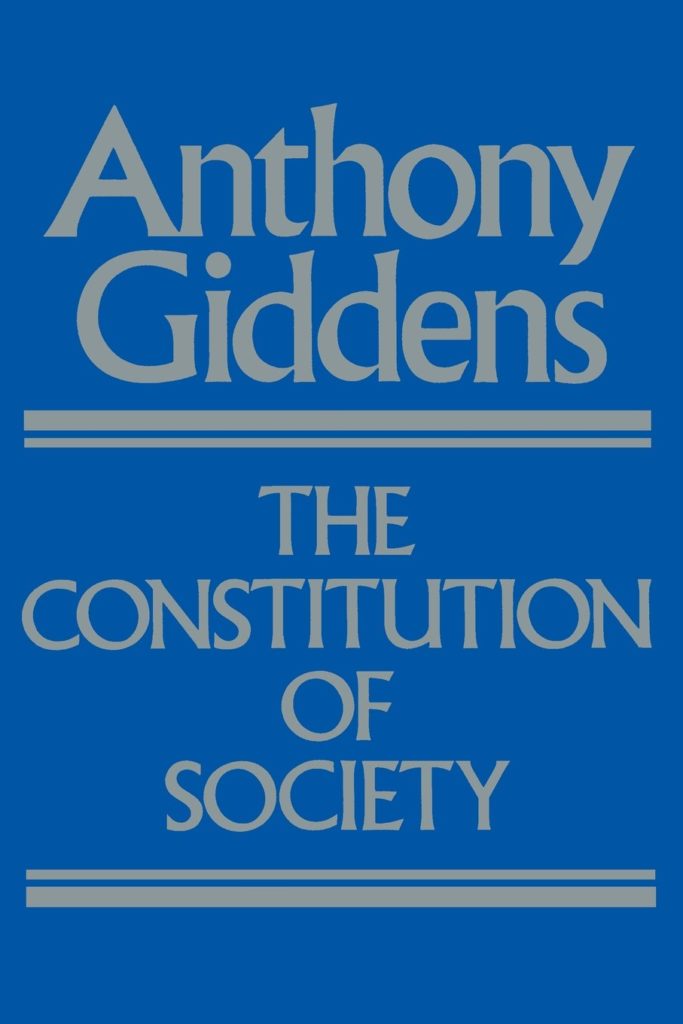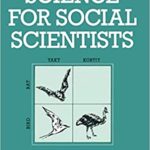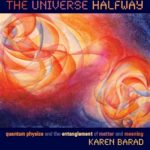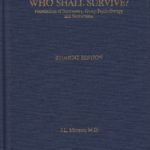
Teoria da estruturação (Giddens 1984)
GIDDENS, Anthony. 1984. The constitution of society: outline of the theory of structuration. Berkeley: University of California Press.
==============================INTRODUCTION
A TEORIA DA ESTRUTURAÇÃO COMO DESENVOLVIMENTO DA TEORIA DA PRÁXIS MARXIANA
The attempt to formulate a coherent account of human agency and of structure demands […] a very considerable conceptual effort. […] It leads on directly to other main themes, especially that of the study of time-space relations. The structural properties of social systems exist only in so far as forms of social conduct are reproduced chronically across time and space. The structuration of institutions can be understood in terms of how it comes about that social activities become ‘stretched’ across wide spans of time-space. Incorporating time-space in the heart of social theory means thinking again about some of the disciplinary divisions which separate sociology from history and from geography. The concept and analysis of history is particularly problematic. This book, indeed, might be accurately described as an extended reflection upon a celebrated and oft-quoted phrase to be found in Marx. Marx comments that ‘Men [let us immediately say human beings] make history, but not in circumstances of their own choosing.’ Well, so they do. But what a diversity of complex problems of social analysis this apparently innocuous pronouncement turns out to disclose! (Giddens 1984:xxi)
O PRESSUPOSTO DA REFLEXIVIDADE DO AGENTE HUMANO; a CONSCIÊNCIA PRÁTICA; a RECURSIVIDADE DA VIDA SOCIAL e a DUALIDADE DA ESTRUTURA
Human agents […] have, as an inherent aspect of what they do, the capacity to understand what they do while they do it. The reflexive capacities of the human actor are characteristically involved in a continuous manner with the flow of day-to-day conduct in the contexts of social activity. But reflexivity operates only partly on a discursive level. What agents know about what they do, and why they do it – their knowledgeability as agents – is largely carried in practical consciousness. Practical consciousness consists of all the things which actors know tacitly about how to ‘go on’ in the contexts of social life without being able to give them expressions. […] The term ‘day-to-day’ encapsulates exactly the routinized character which social life has as it stretches across time-space. The repetitiveness of activities which are undertaken in like manner day after day is the material grounding of what I call the recursive nature of social life. (By its recursive nature I mean that the structured properties of social activity – via the duality of structure – are constantly recreated out of the very resources which constitute them.) (Giddens 1984:xxii-xxiii)
CONCEITO DE ESTRUTURA
In structuration theory ‘structure’ is regarded as rules and resources recursively implicated in social reproduction; institutionalized features of social systems have structural properties in the sense that relationships are stabilized across time and space. (Giddens 1984:xxxi)
RESEARCH…
What is especially useful for the guidance of research is the study of, first, the routinized intersections of practices which are the ‘transformation points’ in structural relations and, second, the modes in which institutionalized practices connect social with system integration. (Giddens 1984:xxxi)
==============================ELEMENTS OF THE THEORY OF STRUCTURATION
NATURALISMO x HERMENÊUTICA:
Whereas for those schools of thought which tend towards naturalism subjectivity has been regarded as something of a mystery, or almost a residual phenomenon, for hermeneutics it is the world of nature which is opaque – which, unlike human activity, can be grasped only from the outside. (Giddens 1984:2)
SOCIOLOGIA como O ESTUDO DE PRÁTICAS SOCIAIS ORDENADAS NO TEMPO-ESPAÇO
The basic domain of study of the social sciences, according to the theory of structuration, is neither the experience of the individual actor, nor the existence of any form of societal totality, but social practices ordered across space and time. (Giddens 1984:2)
SER HUMANO É SER PRATICAMENTE RESPONSÁVEL POR MONITORAR REFLEXIVAMENTE-RACIONALMENTE SUAS AÇÕES
To be a human being is to be a purposive agent, who both has reasons for his or her activities and is able, if asked, to elaborate discursively upon those reasons (including lying about them). […] The reflexive monitoring of action depends upon rationalization, understood here as a process rather than a state and as inherently involved in the competence of agents. (Giddens 1984:3)
CONSCIÊNCIA PRÁTICA e DISCURSIVA e o INCONSCIENTE
The vast bulk of the […] mutual knowledge incorporated in encounters, is not directly accessible to the consciousness of actors. Most such knowledge is practical in character: it is inherent in the capability to ‘go on’ within the routines of social life. The line between discursive and practical consciousness is fluctuating and permeable, both in the experience of the individual agent and as regards comparisons between actors in different contexts of social activity. (Giddens 1984:4)
Between discursive and practical consciousness there is no bar; there are only the differences between what can be said and what is characteristically simply done. However, there are barriers, centred principally upon repression, between discursive consciousness and the unconscious. (Giddens 1984:7)
RACIONALIZAÇÃO como COMPREENSÃO TEÓRICA PELO ATOR COMPETENTE
By the rationalization of action, I mean that actors […] maintain a continuing ‘theoretical understanding’ of the grounds of their activity. […] [I]t is expected by competent agents of others – and is the main criterion of competence applied in day-to-day conduct – that actors will usually be able to explain most of what they do, if asked. (Giddens 1984:5)
AGÊNCIA como PODER DE AGIR; AÇÃO como PRODUÇÃO DE EVENTOS QUE NÃO ACONTECERIAM DE OUTRA FORMA
Agency refers not to the intentions people have in doing things but to their capability of doing those things in the first place (which is why agency implies power […]). Agency concerns events of which an individual is the perpetrator, in the sense that the individual could, at any phase in a given sequence of conduct, have acted differently. Whatever happened would not have happened if that individual had not intervened. Action is a continuous process, a flow, in which the reflexive monitoring which the individual maintains is fundamental to the control of the body that actors ordinarily sustain throughout their day-to-day lives. (Giddens 1984:9)
INTENCIONALIDADE como CONSCIÊNCIA PRÁTICA DOS EFEITOS DA AÇÃO
This concept [intentional] I define as characterizing an act which its perpetrator knows, or believes, will have a particular quality or outcome and where such knowledge is utilized by the author of the act to achieve this quality or outcome. (Giddens 1984:10)
RACIONALIDADE OCULTA
One of the aims of identifying latent functions is to show that apparently irrational social activities may not be so irrational after all. […] [I]f we discover that they have a latent function – an unintended consequence, or set of consequences, which help to secure the continued reproduction of the3e practice in question – then we demonstrate that it is not so irrational at all. (Giddens 1984:12)
AÇÃO e AGENTE (fazem alguma diferença; exercem algum tipo de poder)
Action depends upon the capability of the individual to ‘make a difference’ to a pre-existing state of affairs or course of events. An agent c eases to be such if he or she loses the capability to ‘make a difference’, that is, to exercise some sort of power. (Giddens 1984:14)
[A]ction logically involves power in the sense of transformative capacity.(Giddens 1984:15)
RECURSOS (propriedades estruturadas de sistemas sociais)
Resources (focused via signification and legitimation) are structured properties of social systems, drawn upon and reproduced by knowledgeable agents in the course of interaction. (Giddens 1984:15)
ESTRUTURA (permanência espaço-temporal por reiteração)
Structure thus refers, in social analysis, to the structuring properties allowing the ‘binding’ of time-space in social systems, the properties which make it possible for discernibly similar social practices to exist across varying spans of time and space and which lend them ‘systemic’ form. To say that structure is a ‘virtual order’ of transformative relations means that social systems, as reproduced social practices, do not have ‘structures’ but rather exhibit ‘structural properties’ and that structure exists, as time-space presence, only in its instantiations in such practices and as memory traces orienting the conduct of knowledgeable human agents. (Giddens 1984:17)
QUESTÃO DE PESQUISA (desempenho cotidiano do capitalismo)
In what sense is it the case that when I go about my daily affairs my activities incorporate and reproduce, say, the overall institutions of modern capitalism? (Giddens 1984:19)
ESTRUTURA e INSTITUIÇÃO
The most important aspects of structure are rules and resources recursively involved in institutions. Institutions by definition are the more enduring features of social life. In speaking of the structural properties of social systems, I mean their institutionalized features, giving ‘solidity’ across time and space. I use the concept of ‘structures’ to get at relations of transformation and mediation which are the ‘circuit switches’ underlying observed conditions of system reproduction. (Giddens 1984:24)
TEORIA DA ESTRUTURAÇÃO NUMA CASCA DE NOZ (estrutura como meio e fim pelo qual o agente reproduz o sistema social)
Structure, as recursively organized sets of rules and resources, is out of time and space, save in its instantiations and co-ordination as memory traces, and is marked by an ‘absence of the subject’. The social systems in which structure is recursively implicated, on the contrary, comprise the situated activities of human agents, reproduced across time and space. Analysing the structuration of social systems means studying the modes in which such systems, grounded in the knowledgeable activities of situated actors who draw upon rules and resources in the diversity of action contexts, are produced and reproduced in interaction. […] According to the notion of the duality of structure, the structural properties of social systems are both medium and outcome of the practices they recursively organized. […] Structure is not to be equated with constraint but is always both constraining and enabling. (Giddens 1984:25)
SOMOS TODOS SOCIÓLOGOS (desde que sejamos competentes…)
All competent members of society are vastly skilled in the practical accomplishments of social activities and are expert ‘sociologists’. The knowledge they possess is not incidental to the persistent patterning of social life but is integral to it. (Giddens 1984:26)
A QUESTÃO FUNDAMENTAL DA TEORIA SOCIAL (presença individual estendida no espaço-tempo)
But the fundamental question of social theory, as I see it […] is to explicate how the limitations of individual ‘presence’ are transcended by the ‘stretching’ of social relations across time and space. (Giddens 1984:)
ESQUEMA DOS TEMPOS REVERSÍVEIS (micro-cotidiano e macro-institucional) E IRREVERSÍVEL (meso-individual), E O PAPEL DO CORPO
Time in this case is the time of the body, a frontier of presence quite different from the evaporation of time-space inherent in the duration of day-to-day activity. […] The body is the ‘locus’ of the active self (Giddens 1984:35-6)




 O LaSPA é sediado no Instituto de Filosofia e Ciências Humanas (
O LaSPA é sediado no Instituto de Filosofia e Ciências Humanas (